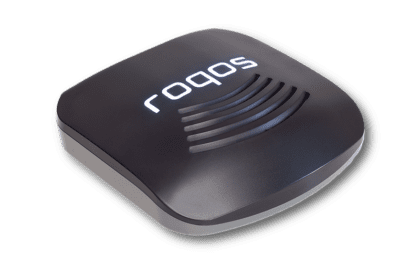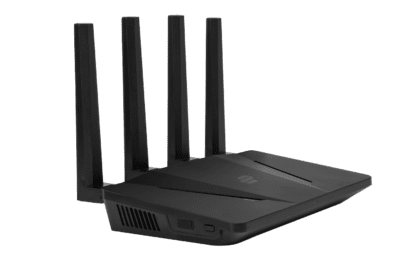
IKEv2/IPSec is a popular and secure VPN Protocol. It offers users speed, security, and flexibility. However, not all devices support it. With FlashRouters, users can experience IKEv2 on their whole network.
What is IKEv2 / IPSec?
IKEv2, or Internet Key Exchange version 2, is a VPN Protocol built around the authentication suite IPSec. The two work together two create a secure tunnel for user data.
How Does IKEv2/ IPSec Work?
Using a Diffie–Hellman key exchange algorithm, the protocol sets up a secure communication channel between your device and the VPN server. IKEv2 then uses that secure communication channel to establish what is called a security association. Meaning, it checks that your device and the VPN server use the same encryption keys and algorithms to communicate. Once the security association is in place, IPSec can create a tunnel and send your data from your device to the secure server.
How Can I Protect All My Devices with IKEv2/IPSec?
Setting up IKeV2 for individual devices may or may not be feasible. However, using a FlashRouter configured for ExpressVPN bypasses those frustrating individual setups.
ExpressVPN’s extensive network gives you the ability to surf anonymously and access the unrestricted Internet in every corner of the globe. It’s perfect if you’re looking to travel to China!
- 3,000+ VPN servers in 90+ countries
- 5-Star Customer Support
- Runs its own SmartDNS Service
IKEv2/IPSec vs OpenVPN: Which is Better?
OpenVPN and IKEv2/IPSec are both popular VPN protocols. Let’s compare how they stack up against each other.
OpenVPN vs IKEv2: Encryption
Both OpenVPN and IKEv2 are considered very secure by security researchers. Both protocols support leading encryption algorithms and 256-bit encryption. And, both have no known vulnerabilities. Meaning, when implemented with a strong encryption algorithm and Perfect Forward Secrecy, users should feel safe knowing their data is secure.
OpenVPN vs IKEv2: Speed
On a speed comparison, IKEv2 edges out OpenVPN. Meaning, users who wish to prioritize speed without sacrificing security can use IKEv2 for their connection. For example, let’s compare the speed users can experience when using one of our most popular routers, the Linksys WRT3200ACM, as when measured with no VPN, OpenVPN, and IKEv2.
OpenVPN vs IKEv2: Stability
When comparing stability, IKEv2 is even more stable than OpenVPN. Thanks to its built-in auto-connect feature the Protocol allows users to still stay connected to VPN, even when switching a Wi-Fi source. Meaning, users who are constantly traveling will find this solution very useful.
IKEv2 vs OpenVPN: Testing the Difference
Understanding the difference between IKEv2/IPSec and OpenVPN is simple when you put the two protocols to the test comparing their performance across the US and worldwide.
How Did We Test IKEv2 vs OpenVPN?
Our team used a Linksys WRT3200ACM FlashRouter, pre-loaded with ExpressVPN’s firmware, and connected to the 5 GHz Wi-Fi band.
Testing was performed approximately 10 feet from the router.
In addition to the testing device, the network had 10+ devices connected to it at the same time, including Smart TVs, laptops, and phones.
No VPN – NYC

IKEv2 – NYC

OpenVPN – NYC

IKEv2 – Los Angeles, CA

OpenVPN – Los Angeles, CA

IKEv2 – East London, GB

OpenVPN – East London, GB

IKEv2 – Tokyo, JP

OpenVPN – Tokyo, JP

Results
After testing the two protocols across the US and two different continents, IKEv2/IPSec came out as the clear winner against OpenVPN in terms of speed.
Do NordVPN-Configured FlashRouters Support IKEv2?
Yes! NordVPN users can take advantage of the IKEv2 protocol on the Roqos VPN Security Hub. This powerful device offers business-level security solutions to the average user.
FEATURES
- Active Threat Monitoring
- Full Network & Bandwidth Control
- Built-in Ad-blocking
- Includes 1 Year of Roqos Core Protect Service
What is the Best Router for Protecting Your Network with IKEv2?
Whether you’re looking for a router for your apartment, dorm, condo, or house, FlashRouters has the perfect solution for you to improve your streaming, browsing, and gaming. FlashRouters offers a number of models to satisfy the needs of any user.
FEATURES
- Built-in Wi-Fi 6
- Supports ExpressVPN Lightway Protocol by Default
- Use Up To 5 Servers At Once With Device Groups
What Are the Benefits of Using IKEv2?
High level of encryption
As we mentioned, IKEv2 uses the leading Diffie–Hellman key exchange algorithm. The server supports leading configurations like AES, Blowfish, and Camellia. The protocol supports 256-bit encryption and allows Perfect Forward Secrecy.
Highly Stable
IKEv2 is one of the most stable VPN protocols currently available. It supports the Mobility and Multihoming protocol, which allows for improved reliability, and offers an auto-connect option.
High Speeds
One of the biggest reasons for IKEv2’s popularity is how fast the protocol is. Unlike previous VPN protocols, IKEv2/IPSec offers users a high-speed transfer without sacrificing security.
Is there a downside to IKEv2/ IPSec?
While IKEv2 has many benefits, it’s worth noting that there are certain issues that users may face when using IKEv2, which we’ve outlined below.
Potentially easy to block
At the moment, IKEv2 exclusively uses the UDP port 500 for the initial key exchange. Meaning, it can potentially be easier to block than other protocols like OpenVPN.
Limited Device Support
Perhaps the biggest issue with IKEv2 is limited device support. At the moment, few VPN providers offer configurations for IKEv2 and, those that do, do not support all devices, but that should change in the coming year.
Have any questions about IKEv2/IPSec, OpenVPN, VPN protocols, or network setups in general? Feel free to reach out to us!










